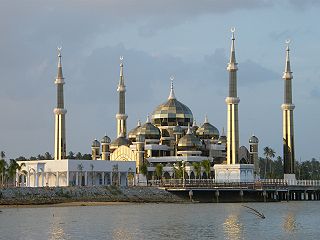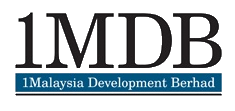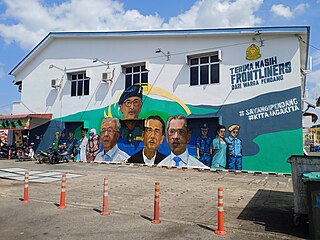
The Bakun Dam is an embankment dam located in Belaga District, Kapit Division, Sarawak, Malaysia, on the Balui River, a tributary or source of the Rajang River and some sixty kilometres east of Belaga. As part of the project, the second-tallest concrete-faced rockfill dam in the world would be built. It would generate 2,400 megawatts (MW) of electricity once completed.

Lim Guan Eng is a Malaysian politician and accountant from the Democratic Action Party (DAP), a component party of the Pakatan Harapan (PH) coalition who has served as Member of Parliament (MP) for Bagan, Member of the Penang State Legislative Assembly (MLA) for Air Putih since March 2008 and 5th National Chairman of DAP since March 2022. He served as the Minister of Finance in the PH administration under former Prime Minister Mahathir Mohamad from May 2018 to the collapse of the PH administration in February 2020, 4th Chief Minister of Penang from March 2008 to May 2018, MP for Kota Melaka from August 1986 to November 1999 and 4th Secretary-General of DAP from September 2004 to March 2022.

The Pan-Borneo Highway including the sections now known as the Pan Borneo Expressway, is a controlled-access highway on Borneo Island, connecting two Malaysian states, Sabah and Sarawak, with Brunei. The length of the entire highway is 2,083 kilometres (1,294 mi) for the Malaysian section, 168 kilometres (104 mi) for the Bruneian section.
BioValley is a cluster proposed by the government to attract the biotechnological industry to Malaysia It was planned as a launch pad for Malaysia, biotechnological industry, as the Multimedia Super Corridor and Cyberjaya was intended for the IT industry. It was also considered an important component for the Vision 2020 plan and Malaysia's future as a knowledge economy. It was originally intended to be situated in Dengkil three research institutions are planned for the first phase, the National Institute for Genomics and Molecular Biology, the National Institute for Pharmaceutical and Neutraceutical Biotechnology and National Institute for Agro-Biotechnology. Its location would put it within the Multimedia Super Corridor and in close proximity and to the south of the IT hub of Cyberjaya and the administrative capital of Putrajaya. It would also therefore be within reasonable proximity to the capital of Kuala Lumpur.
The East Coast Economic Region is an economic development region based on the east coast of Peninsular Malaysia, which covers the states of Kelantan, Terengganu, and Pahang, and the Johorean districts of Mersing and Segamat. ECER is also one of the three economic corridors launched in Peninsular Malaysia under the leadership of Abdullah Ahmad Badawi, the fifth Prime Minister of Malaysia. The other corridors are Iskandar Malaysia in Johor and the Northern Corridor Economic Region (NCER) that covers the states of Penang, Kedah, Perlis and Perak. The ECER development program spans 12 years, beginning in 2007, and involves Public-Private Participation (PPP).

This article lists important figures and events in Malaysian public affairs during the year 2008, together with the deaths of notable Malaysians.

The Sabah Development Corridor or SDC is a new development corridor in Sabah, Malaysia. The SDC was launched on 29 January 2008 by the Malaysian fifth Prime Minister, Abdullah Ahmad Badawi.

The Sarawak Corridor of Renewable Energy is an economic region and development corridor covering central Sarawak, a Malaysian State on the island of Borneo. SCORE was launched in 2008. It is one of the five regional development corridors launched throughout Malaysia during the Abdullah Badawi administration. SCORE is managed by the Regional Corridors Development Authority ("RECODA"), a state government agency created through an Ordinance of the State Legislative Assembly.

Malaysia–Sweden relations refers to foreign relations between Malaysia and Sweden. Sweden has an embassy in Kuala Lumpur, and Malaysia has an embassy in Stockholm. As of 2009, 90 Swedish companies are present in Malaysia and about 450 Swedish citizens live in Malaysia. The number of Swedish citizens visiting Malaysia in 2011 was 44,138.

General elections were held in Malaysia on Sunday, 5 May 2013. Voting took place in all 222 parliamentary constituencies, each electing one MP to the Dewan Rakyat, the dominant house of Parliament. State elections also took place in 505 state constituencies in 12 of the 13 states on the same day. The elections were the first since Najib Razak became Prime Minister in 2009.
Labuan–Menumbok Bridge or Labuan Bridge is a new planned bridge connecting Labuan Island in Federal Territory of Labuan and Menumbok in Sabah, Malaysia.

1Malaysia Development Berhad is an insolvent Malaysian strategic development company, wholly owned by the Minister of Finance (Incorporated).
Subsidy reform in Malaysia was initiated in July 2010 by Prime Minister Najib Razak via a reduction in subsidies for fuel and sugar. Further cuts in subsidies for these and other products are planned over a three- to five-year period to strengthen government finances and improve economic efficiency.

The following lists events from 2015 in Malaysia.

Events in 2016 in Malaysia.
The Malaysian federal budget for 2015 fiscal year was presented to the Dewan Rakyat by Prime Minister and Minister of Finance, Najib Razak on Friday, 10 October 2014.
The Malaysian federal budget for 2014 fiscal year was presented to the Dewan Rakyat by Prime Minister and Minister of Finance, Najib Razak on Friday, 25 October 2013.
Shared Prosperity Vision 2030, is a government blueprint released in 2020 by the Government of Malaysia for the period of 2021 to 2030 to increase the incomes of all ethnic groups, particularly the Bumiputera comprising the B40, the hardcore poor, the economically poor, those in economic transition, Orang Asli, Sabah and Sarawak bumiputeras, the disabled, youths, women, children and senior citizens.

The Government of Malaysia along with various non governmental organisations (NGOs), companies, and foreign governments introduced various financial aid and relief programs in response to the economic impacts of the COVID-19 pandemic in Malaysia. On 27 March 2020, Prime Minister Muhyiddin Yassin introduced an economic stimulus package known as the Prihatin worth RM250 billion.

The economy of Sarawak is the fourth-largest of the states of Malaysia, making up 9.3% of the Malaysian gross domestic product (GDP) in 2022. Meanwhile, Sarawak is home to 7.9% of the Malaysian population based on the 2020 census.












